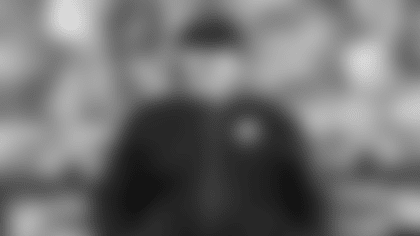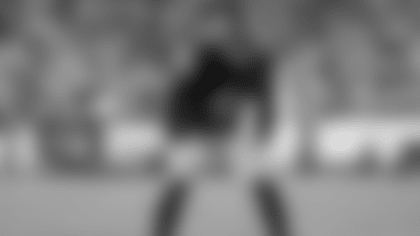LATROBE, Pa. – By mid-afternoon yesterday, the 2019 wannabe Pittsburgh Steelers had assembled on campus here, and the clock began ticking toward the start of the NFL regular season. For the next three weeks, the Steelers will use the grass at Saint Vincent College to attempt to solve, or at least get a better handle on, a wide range of issues attached to the apparent strengths and weaknesses of their roster.
A couple of weeks later they will cut to 53 and possibly utilize the waiver wire to tie up some loose ends. But what will they find awaiting them at the start of this regular season, besides Tom Brady and the defending champion New England Patriots? That's a big unknown, even to Al Riveron.
You see, 2019 is being billed as NFL 100, a celebration of the National Football League's 100th season, and it wouldn't be a good look for the conversation to be dominated by some inconsistent or overzealous application of the new rule allowing called or uncalled pass interference penalties to be subject to instant replay.
Already there have been warnings sounded.
As Peter King wrote for NBCsports.com: "We won't know for a while if we've finally gone too far with replay, if reviewing the consistently controversial calls of defensive and offensive pass interference will be the Rubicon the NFL just can't cross … I'm as concerned with the unintended consequences of this rules tweak as the intended one. Yes, we all want obvious blown calls to be fixed. But if you read this column, you watch football. And you see the super-slo-motion replays of pass interference, and if you're with five people watching, there could be a 3-3 or 4-2 split about whether there was pass interference on the play … and maybe even whether the offensive players or the defensive players were the guilty party. Or whether both were."
As NFL Network's Rich Eisen wrote after vice president of officiating Al Riveron conducted a symposium for the network back in June: "Riveron would show a sequence involving a possible offensive pass interference, pause the play and ask the room if we would throw a flag for OPI. Half of the room would say 'yes' and the other half 'no.' Then, he would ask us if there was no penalty called, would we, as the replay official, put a flag down on the field for OPI. Half the room said 'yes' and the other half of the room said 'no.' Riveron's well-taken point: not everything in this endeavor is going to be so glaring and easy to correct as the NFC Championship Game non-call."
Ah, the NFC Championship Game non-call. That was the fuel that pushed this imitative across the finish line in the first place. Rams defensive back Nickell Robey-Coleman blasting Saints receiver Tommylee Lewis, and clearly blasted him before Drew Brees' pass arrived in the vicinity. The narrative of the Saints being wronged, denied their rightful berth in the Super Bowl, and the potential for such a wrong to impact negatively the professional lives of coaches combined with the incessant replaying of a badly missed call got the owners to vote for this addition to instant replay.
One commonly heard justification for this change had to do with the fact that since fans are able to see clearly when one of these calls is missed, it's incumbent on the league to take advantage of the technology to make things right. But as Chuck Noll pointed out over 30 yards ago when told instant replay was a way to get things right: "What if it doesn't?"
Indeed, what if this doesn't get things right? What if what looks to be egregious contact on a high-definition screen with the action playing out in super-slo-motion in real time was actually incidental contact? What if incidental contact by one player serves to offset an actual foul by his opponent? What if contact that happens on the other side of the field and has no impact on the play negates a great catch in the end zone for a touchdown? Or negates an interception? Is that football justice? Is that getting things right?
In various sessions with the media over the summer, Riveron repeatedly made assurances that replay won't change decisions made on the field unless there is "clear and obvious" evidence to do so.
"Pass interference is not a new rule in any way," said Riveron from the NFL's annual summer officiating seminar in Dallas. "We will start with the premise that the ruling on the field, whatever it is, is correct. If we do not find clear and obvious visual evidence to overturn the ruling on the field, we will not reverse the call."
Sounds good, but that also was supposed to be the standard on whether it was a catch or incomplete, and after much complaining about overreaching replay decisions, including the one that took a Jesse James touchdown off the board late in what turned out to be a 2017 Steelers loss to New England that directly impacted playoff seedings and the subsequent postseason pairings, the league reversed course and that season's Super Bowl clearly was officiated differently in terms of catch/non-catch situations.
"In my experience, I never thought creating a rule for one play — even as obvious as that play was — you can get bad rules that way," former NFL senior V.P. of officiating Dean Blandino, now a FOX rules analyst, told Dom Cosentino of Deadspin.com regarding the league's reaction to the NFC Championship Game debacle. "Nobody wants to see [that], and everybody wants to fix that. But I feel like, you create a rule to fix that play, and what we're going to see is a whole bunch of other plays that are going to be impacted, and very few of the plays like what happened in the Rams-Saints game.
"I don't think anybody knows exactly how this is going to play out until we start actually playing games," Blandino concluded.
And that's the real shame of it all.














